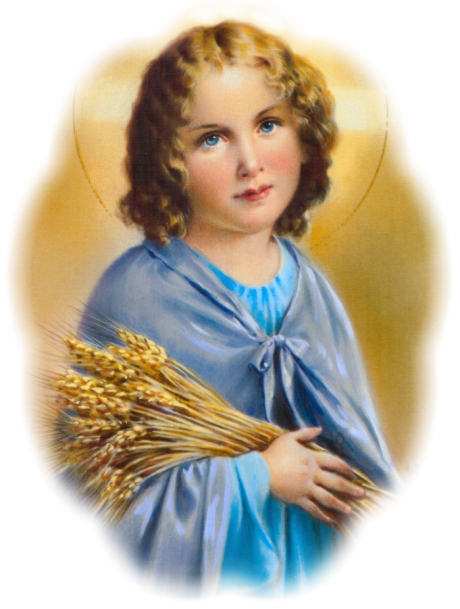  DISCOURSES FOR ADVENT Taken from THE INCARNATION, BIRTH AND INFANCY OF JESUS CHRIST by St. Alphonsus Liguori THE REDEMPTORIST FATHERS 1927 With Nihil Obstat and Imprimatur DISCOURSE V The Eternal Word From Being Strong Became Weak Part 2 And for what reason did Jesus Christ become so weak? He made Himself weak, as we said above, that so He might communicate His strength to us: and by this means conquer and subdue the powers of Hell: The lion of the tribe of Juda hath prevailed. [Apoc. 5:5] David says that the will to save us and to free us from death is a part and property of God's Divine nature. Our God is the God of salvation: And of the Lord, of the Lord are the issues from death. [Ps. 67:21] On which passage Bellarmine makes this commentary: "This is proper to Him, this is His very nature; our God is a saving God, and of our God are the issues of death---that is, the delivery from death." Are we indeed weak? Let us put our trust in Jesus Christ, and we shall be capable of all things: I can do all things in Him Who strengtheneth me, said the Apostle. [Phil. 4;13] I am able for all things, not by my own strength, but by the strength which my Redeemer has obtained for me through His merits: Have confidence, I have overcome the world. [John 16:33] Take courage, my children, Jesus Christ says to us; if you are unable to resist your enemies, I have overcome the world, and know that I have overcome it for you. My conquest was to give you the spoils; avail yourselves now of the arms which I leave you to defend yourselves, for you are sure to triumph.  What are the arms which Jesus Christ has left us? They are two, the use of the Sacraments and prayer. Everybody knows that by means of the Sacraments, especially of penance and the Holy Eucharist, are imparted to us the graces which our Saviour has merited for us; and experience shows us every day that those who frequent the Sacraments easily keep themselves in the grace of God. And, especially, how is he that often communicates strengthened in a wonderful manner to vanquish temptations! The Holy Eucharist is called bread, the heavenly bread, that we may understand how the Communion preserves the life of the soul, which is Divine grace, just as earthly bread preserves the life of the body. For the same reason the Council of Trent calls Holy Communion a remedy which relieves us from venial and preserves us from mortal sins: "An antidote by which we are freed from daily faults, and are preserved from mortal sins." St. Thomas, speaking of the Holy Eucharist, says that the wound left by sin would remain incurable, were it not for this remedy which is given to us. "It would be incurable, were it not the medicine of God applied to cure us." Moreover, Innocent III says that the Passion of Jesus Christ delivers s from the chains of sin, and the Holy Communion defers us from the will to sin: "The mystery of the Cross delivers us from the power of sin; the mystery of the Eucharist, from the will to sin." The other grand means of overcoming temptations is prayer offered to God through the merits of Jesus Christ: Amen, Amen, I say to you (said our Redeemer), if you ask the Father anything in My name, He will give it you. [John 16:23] Whatsoever, then, we ask of God in the name of Jesus Christ, that is, through His merits, we shall certainly obtain it. And this, we see, happens continually; all those who are tempted and have recourse to God, and invoke Him through Jesus Christ, invariably come off victorious; and, on the contrary, those who in temptation (especially of impurity) neglect to recommend themselves to God, fall miserably and perish. And then they excuse themselves by saying they are but of flesh, and are very weak. But how can they reasonably allege their weakness as an excuse, when they are able to acquire strength by having recourse to Jesus Christ (for it is enough to call with confidence on His Most Holy Name), and they will not do so? What excuse, I say, would that man have for having been vanquished by his enemy, who, when the requisite arms for his defence were presented him, had despised and refused them? Were such a man to allege his weakness, who would not instantly condemn him with these words,---And you, knowing as you did your own weakness, why did you not avail yourself of the arms that were offered you? St. Augustine says that the devil was put in chains by Jesus Christ; he can bark, but he cannot bite anyone, except those who wish to be bitten. That man is really a fool (continues the Saint) who allows himself to be bitten by a dog chained up: "Christ came and, chained the devil. He is bound in chains like a dog. Foolish is the man whom a dog in chains bites. He can bark, he can make attempts; he can only bite him who wills so; for he does not extort our consent from us, but seeks it." And in another passage he says that the Redeemer has given us every remedy to effect our cure; he that will not observe the laws and is put to death, dies because he wishes his own death. "As far as the physician is concerned, he came to heal; he destroys himself who will not observe the laws." He that takes advantage of Jesus Christ is not weak; no, but he waxes strong on the strength of Jesus Christ. Jesus it is Who, as St. Augustine says, not only cheers us on to the combat, but affords us help; if we fail, He is ready to succor us; and of His immense goodness He Himself crowns us in the end: "He encourages you to fight, and helps you to conquer, and supports you if you languish, and crowns you victorious." Isaias prophesied, Then shall the lame man leap as a hart; that is, by the merits of the Redeemer, he who could not stir one step should skip over the hills as a swift hart: And that which was dry land shall become a pool, and the thirsty land springs of water; he foretells that the most parched-up soil should teem with virtues: In the dens where dragons dwelt before shall rise up the verdure of the reed and the bulrush; [35:6,7] and that in those souls in which devils formerly abode should be propagated the vigor of the reed,---namely, of humility, because, according to the commentary of Cornelius à Lapide, "the humble man is empty in his own eyes;" and of the bulrush,---namely, of charity, because, as the same commentator says, in certain places they use it for wicks to burn in lamps. In a word, we find in Jesus Christ all grace, all strength, all help, whenever we have recourse to Him: In all things you are made rich in Him, so that nothing is wanting to you in any grace. [1 Cor. 1:5] For this very end He was made Man, and emptied Himself: "He emptied Himself." [Phil. 2:7] "He, as it were, reduced Himself to nothing," says a certain author; "He made Himself empty of majesty, of glory, of strength." In a manner, He lowered Himself to nothing; He put off His majesty, glory, and power, and took on Himself ignominies and infirmities, to make over to us His worth and His virtues, that so He might be our light, our justice, our satisfaction, and our ransom: Who is made unto us wisdom, and justice, and sanctification, and redemption. [1 Cor. 1:30] And He remains ready at any moment to give health and strength to everyone that asks Him. I saw One girt about the paps with a golden girdle. [Apoc. 1:12] St. John saw the Lord with His breasts full of milk (that is, full of graces), and bound about with a girdle of gold; this signifies that Jesus Christ is, as it were, hemmed round and compressed with the love He bears to man; and as the mother, whose breast is oversupplied with milk, seeks for children who may imbibe the nourishment and relieve her of the burden, so does He yearn for us to come and seek graces of Him, and the necessary help to conquer our enemies, who strive to rob us of His friendship and of eternal salvation. Oh, how bounteous and liberal is God with a soul that sincerely and resolutely seeks Him! The Lord is good to the soul that seeketh Him. [Lam. 3:25] Wherefore, if we do not become Saints, the failure rests with us, because we do not resolve to wish for God alone: The sluggard willeth and willeth not. [Prov. 13:4] The lukewarm will and will not; and therefore they remain defeated, because they want the resolute will to please God alone. A resolute will overcomes everything; for when once a soul determines really to give itself wholly to God, God immediately gives it the hand and the strength to surmount all difficulties that may occur in the way of perfection. This was the splendid promise which Isaias signified to us in these words: O, that Thou wouldst rend the heavens and wouldst come down; the mountains would melt away at Thy presence. [64:1] The crooked shall become straight, and the rough ways plain. [40:4] At the coming of the Redeemer He will endow our souls with such a strength of good-will that they will find levelled down the mountains of all the carnal appetites; and they will find the crooked ways made straight, and the rough ways plain; that is, the contempts and labors which formerly were so difficult and hard for men to bear will, by means of the grace given by Jesus Christ, and of the Divine love which He enkindles in their hearts, be afterwards all made sweet and easy. Thus was it that St. John of God rejoiced at being beaten as a fool in a hospital; thus St. Lydwine was glad to find herself during so many years tied down to her bed by a body full of wounds and sores; thus St. Laurence exulted and mocked the tyrant, while scorching on a gridiron, and giving his life for Jesus Christ. And so likewise do so many souls enamoured of God find peace and contentment, not, indeed, in the pleasures and honors of the world, but in sufferings and insults. Ah! let us beg Jesus Christ to impart to us that fire which He came on earth to enkindle; that so we may no longer find it difficult to despise goods of dirt, and to undertake great things for God. "He that loves, labors not," says St. Augustine; the soul that loves God only finds it neither irksome nor painful to suffer, to pray, to mortify itself, to humble itself, and to detach itself from the pleasures of earth. The more it works and suffers, the more it is eager to do and to suffer: Jealousy is hard as Hell; the lamps thereof are fire and flames. [Cant. 8:6] The flames, of Divine love are like the flames of Hell, which never say it is enough. Nothing whatever satisfies a soul that -loves God. As for Hell no fire is sufficient, so for the loving soul its ardor is never satisfied. Let us ask this great gift through the intercession of Mary, by whose hands (as was revealed to St. Mary Magdalene of Pazzi) Divine love is bestowed upon souls. She is God's treasure, the treasurer of all graces (especially of Divine love), as she was called by the Idiota, "The treasure and the treasurer of graces." Affections and Prayers My sovereign God and Redeemer, I was lost; Thou hast ransomed me from Hell, But, unhappy me! I have often afterwards lost myself anew, and Thou hast as often released me from eternal death: "I am Thine, save me." [Ps. 118:94] Since, as I hope, I am now Thine, suffer me never more to cast myself away by rebelling against Thee. I am resolved to suffer death, and a thousand deaths, rather than see myself ever again Thy enemy and the slave of the devil. But Thou knowest my weakness. Thou knowest my past treacheries. Thou must give me strength to resist the assaults which Hell will make upon me. I know that I shall be assisted by Thee in temptation whenever I shall have recourse to Thee, since I have Thy promise for it: Ask, and you shall receive. [John 16:24] Everyone that asketh receiveth. [Matt. 7:8] But my fear is, lest in the moment of trial I should fail to recommend myself to Thee, and so be miserably overcome. This, therefore, is the grace which I most earnestly implore of Thee: grant me light and strength on all occasions to have recourse to Thee, and to invoke Thee whenever I am tempted; and, moreover, I entreat Thee to grant me Thy help, that I may always ask Thee for this grace. Grant it me by the merits of Thy Precious Blood. And thou, O Mary, obtain it for me by the love which thou bearest to Jesus Christ. VIEW THE CHRIST CHILD FULL IMAGE., PLAIN 
 HOME-----------------------------------------------------OUR LADY www.catholictradition.org/Advent/incarnation5b.htm |